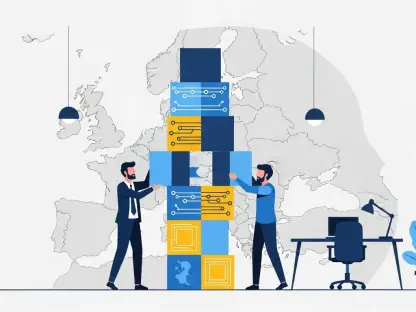In the heart of Stockholm, a tech revolution is brewing, challenging the long-held dominance of Silicon Valley in artificial intelligence. Picture a startup, barely a year old, skyrocketing to $200 million in annual recurring revenue, turning heads at one of Europe’s premier tech gatherings, proving that groundbreaking innovation is possible outside the U.S. This isn’t a fantasy—it’s the reality of Lovable, a Swedish AI-assisted coding company making waves on a global scale. As the tech world watches, a pressing question emerges: can Europe, with its unique strengths, truly stand toe-to-toe with the innovation powerhouse of California?
The significance of this story lies in its broader implications for the global tech landscape. Silicon Valley has reigned supreme for decades, but rising costs and fierce competition are exposing vulnerabilities. Europe, often underestimated, is stepping into the spotlight with companies like Lovable proving that groundbreaking innovation doesn’t require a U.S. zip code. This shift could redefine where and how the future of AI is built, potentially decentralizing tech power and fostering a more diverse industry.
A New Tech Titan Emerges in Stockholm
Lovable’s ascent is nothing short of staggering. Announced at the Slush conference in Helsinki this year, the company revealed it hit $200 million in annual recurring revenue (ARR) just four months after reaching $100 million earlier in the season. This milestone, achieved within a year of founding, positions the Stockholm-based firm as a serious contender in the AI-coding space, signaling that Europe might be crafting its own tech giants.
What sets this achievement apart is the speed and scale of growth. With a valuation of $1.8 billion following a $200 million Series A funding round led by Accel, Lovable has captured investor confidence in a way few startups can claim. This financial backing reflects a growing belief that AI-driven solutions, especially in coding, are poised to transform industries at an unprecedented pace.
Beyond numbers, Lovable’s story challenges conventional wisdom. Remaining in Stockholm rather than relocating to Silicon Valley, the company has tapped into a different kind of energy—one rooted in focus over frenzy. This bold choice hints at a seismic shift, suggesting that the next wave of tech innovation might not originate from the usual suspects but from quieter, yet equally potent, corners of the world.
Why Europe’s Tech Scene Demands Attention
As AI continues to reshape everything from healthcare to software development, the global race for dominance intensifies. Silicon Valley’s ecosystem, built on vast networks and rapid scaling, has long been the gold standard. Yet, challenges like exorbitant operational costs and a hyper-competitive environment are pushing some to look elsewhere for sustainable growth models.
Europe offers a compelling alternative. With diverse talent pools, supportive government policies for tech initiatives, and a cultural emphasis on work-life balance, the region provides fertile ground for innovation. Stockholm, in particular, has emerged as a hub where startups can prioritize depth over distraction, a contrast to the often chaotic pace of California’s tech epicenter.
Lovable’s success amplifies this narrative. Achieving a $1.8 billion valuation in such a short time frame isn’t just a company-specific win; it underscores Europe’s potential to redefine the rules of tech leadership. If more firms follow this path, the continent could become a central player, balancing Silicon Valley’s scale with its own unique approach to fostering creativity and progress.
Lovable’s Winning Formula in the AI Space
Digging into Lovable’s strategy reveals a deliberate blueprint for success. Choosing to stay rooted in Stockholm, despite external pressures to move west, allowed the company to cultivate a unified team driven by purpose rather than hype. Co-founder Anton Osika has emphasized how this decision enabled a strategic focus, free from the relentless noise often found in larger tech hubs.
Talent acquisition further sets Lovable apart. In a striking reversal of the typical brain drain, the company has lured professionals from Silicon Valley heavyweights like Notion and Gusto to relocate to Sweden for in-person roles. Accel partner Zhenya Loginov described this as a powerful indicator of Lovable’s vision and workplace culture, highlighting how the startup is rewriting the playbook on attracting global expertise.
Financially, Lovable stands on solid ground with over $225 million in total funding. This includes the massive Series A round, which mirrors the investor enthusiasm seen in competitors like Cursor, valued at $29.3 billion after a $2.3 billion raise. These elements—geographic commitment, talent magnetism, and robust capital—position Lovable as a prime example of how European startups can thrive in the competitive AI arena.
Insights from Europe’s Tech Pioneers
Voices from the forefront of this movement add depth to the discussion. Anton Osika, speaking at the Slush event, articulated a clear stance: staying in Europe offers access to exceptional talent and a mission-driven environment uncluttered by the distractions prevalent in Silicon Valley. This perspective flips the traditional narrative that global tech success demands a move to the U.S.
Echoing this sentiment, Zhenya Loginov of Accel marveled at Lovable’s ability to pull top-tier professionals across the Atlantic to Stockholm. This “reverse migration,” as Loginov termed it, reflects not just the company’s appeal but also a broader shift in where tech talent sees opportunity. It’s a sign that Europe’s tech hubs are gaining magnetic pull.
Industry trends bolster these personal accounts. The AI-coding sector is witnessing explosive growth, with Cursor’s recent funding round signaling a market eager for innovative tools. Lovable’s own financial milestones, paired with such market dynamics, paint a picture of Europe as a formidable force, capable of not just participating but potentially leading in this transformative field.
How Europe Can Narrow the Innovation Gap
To compete with Silicon Valley on equal footing, Europe must adopt targeted strategies drawn from successes like Lovable’s. Building robust local ecosystems is paramount—creating environments where talent stays and thrives, as seen in Stockholm, can prevent the outflow of skills to other regions. Hubs that prioritize mission over mere growth metrics could become magnets for innovation.
Engaging user communities also offers a powerful edge. Lovable’s active Discord base, where feedback on aspects like WordPress operations drives product refinement, exemplifies how direct interaction fuels progress. European startups can harness similar platforms to build loyalty and iterate quickly, staying ahead of user needs in a fast-evolving market.
Finally, securing venture capital through standout results is critical. Lovable’s $200 million ARR in under a year demonstrates that Europe can deliver high returns, attracting more investment. Coupling this with a focus on emerging trends like “vibe coding” and AI-assisted development can position the continent’s firms as leaders in shaping tech’s future, offering a clear path toward global relevance.
Reflecting on a New Era for Tech
Looking back, Lovable’s rapid climb to $200 million in annual recurring revenue stood as a defining moment for Europe’s tech ambitions. The company’s steadfast choice to remain in Stockholm, coupled with its knack for drawing elite talent and engaging users, carved a new narrative that defied Silicon Valley’s gravitational pull. This journey illuminated a path others could follow, proving that innovation knows no single home.
The broader industry also felt the ripple effects, as hefty investments in AI-coding tools like those of Lovable and Cursor underscored a market hungry for change. These financial commitments reflected a shared belief among stakeholders that Europe holds untapped potential to redefine tech’s epicenter. The numbers and stories aligned to challenge old assumptions about where groundbreaking ideas must originate.
Moving forward, the focus should shift to actionable growth. European policymakers and entrepreneurs ought to double down on fostering local talent hubs, incentivizing community-driven innovation, and showcasing high-impact results to investors. Embracing cutting-edge trends in AI can further cement the region’s role as a contender. As the tech world evolves, Europe’s next steps will determine whether this momentum builds into a lasting legacy of leadership.









